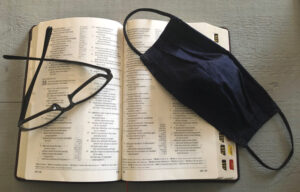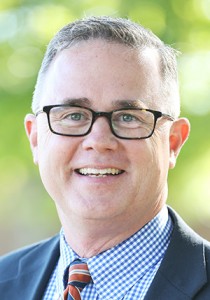By Todd E. Brady
Vice President For University Ministries, Union University, Jackson
 Sometimes what we think are the worst things happening to us can end up being the best things for us. What has been a global pandemic has turned out to be a divine “plandemic” for us at Chapel Hill Baptist Church in Milan.
Sometimes what we think are the worst things happening to us can end up being the best things for us. What has been a global pandemic has turned out to be a divine “plandemic” for us at Chapel Hill Baptist Church in Milan.
During the time we were hearing words like “unprecedented,” “shutter,” and “social-distancing,” we found the time to evaluate programming, to realize what is really important, and to pursue areas for improvement and spiritual growth. Sure, we’ve taken chairs out and moved them around to ensure social distancing, but through it all we’ve gained a new understanding that it’s ultimately about the people in those chairs knowing God and growing in their relationship with Him.
Many church leaders have felt like life itself was on hold as programs were not able to be conducted, in person appointments were not able to take place, and churches were not able to gather as they once did. Pastors have felt the pressure and anxiety of making decisions related to COVID-19 protocols. There has been much focus on what can’t be done in the church. But what can’t be done is not the issue. COVID-19 has caused us to remember and reflect on what should be done in the church.
There have been various articles published about pastors and “decision fatigue,” ministerial frustration, pastors leaving the ministry and other stressful issues caused by COVID-19.
Our experience has been different. Church staff at Chapel Hill has not experienced the stress and division that many church leaders have lamented over throughout the past year. During this time, God has sharpened our focus, clarified our purpose, and pressed upon us what we really need to be about. We have been reminded of three lessons:
1. Pastors oversee a spiritual work. There may not have been as many programs and peripheral matters to oversee and manage, but we realized that many of these things are not what we were supposed to be about in the first place. Our calling is to oversee souls. We’ve not been able to quantify things that we can report in the Annual Church Profile (ACP), but ultimately, it’s not the ACP that matters. For pastors, it’s about the faithfulness of overseeing souls, and pastoring souls is difficult to count.
A year ago, much of the physical work of leading ministries and programs in a church became impossible. After attending a Zoom meeting and hearing other pastors lament about all the things they couldn’t do, our church staff met (by Zoom), divided up the church roll, and assigned church members to each person on our team.
We prayed for our members by name and communicated with them by e-mail, text, and phone calls. That wasn’t the flashiest ministry around but it was some of the greatest ministry that we’ve ever done. COVID-19 or not, the regular and systematic prayer for those in our care will be a regular part of the days ahead.
 2. Pastors are primarily about the work of preaching and teaching. Sure, we changed the venues and methods by which we gathered. We spread out the chairs in the sanctuary. We didn’t physically gather at all for a while. We had drive-in church in the parking lot a few Sundays as folks gathered in their cars, listening to the worship service on their radios. Eventually when the weather was good, folks got their yard chairs out and we had church outside. We came back in the sanctuary and had two services. Now, we’re back to one service.
2. Pastors are primarily about the work of preaching and teaching. Sure, we changed the venues and methods by which we gathered. We spread out the chairs in the sanctuary. We didn’t physically gather at all for a while. We had drive-in church in the parking lot a few Sundays as folks gathered in their cars, listening to the worship service on their radios. Eventually when the weather was good, folks got their yard chairs out and we had church outside. We came back in the sanctuary and had two services. Now, we’re back to one service.
As our associate pastor, Mark Brown said, “The pandemic put a premium on the seemingly simple but vital mandate of gathering together.”
Over the past year, we’ve walked through Philippians, Habakkuk, and I Timothy together. Concerning the proclamation of the gospel, we’re thankful that we’ve not missed a beat. Hebrews 10:24-25; Romans 10:17; I Timothy 4:13; II Timothy 4:1-2.
3. Pastors avoid the temptation of speaking to and leading everything. One of the most effective (and most congregational!) things we did last summer was establish a COVID-19 Response Team of thoughtful men and women in the church. These were healthcare professionals, educators, retired individuals and others who made recommendations to the church about our gatherings and protocols.
Realizing that the congregation is the final court of authority in a Baptist church and like the leaders in Acts 6:2-4, our pastors assembled and empowered the team and asked them to make decisions for the church.
Not trained medically, we knew that once this group got up and running, the best service we could provide was to stay out of their way. We simply asked them to operate according to two guidelines: 1. the priority of the church and 2. the protection of the people.
They did and are doing a great job. Whatever they asked us to do, we did it.
I’ll state this bluntly. Your church doesn’t need to hear your opinion about COVID-19. They need you to preach the word and pastor them.
Our staff has not experienced the stress and anxiety of making decisions about having services, social distancing, or about matters like wearing masks. On the contrary, we’ve followed the expertise and recommendations of leaders (the COVID-19 Response Team) in our church. We’ve focused on what we should be focused on. And in it all, each of us on the church staff has slept really well at night.
Too often, we get focused on what we can’t do rather than what we can do. When this life is over, not only will we one day stand before God (Hebrews 9:27) and give an account of our own souls, we will give an account of the souls in our care (Hebrews 13:17).
Much has changed over the last year, but our mission has not. Jesus said, “Go therefore and make disciples of all nations, baptizing them in the name of the Father and of the Son and of the Holy Spirit, teaching them to observe all that I have commanded you. (Matthew 28:19-20)
In Isaiah 55:8-6, God says “For my thoughts are not your thoughts, neither are your ways my ways, declares the Lord. For as the heavens are higher than the earth, so are my ways higher than your ways and my thoughts than your thoughts.” After this “unprecedented” year, I’m not sure I understand these words any better, but I sure do believe them. B&R — Brady is serving as interim pastor of Chapel Hill Baptist Church, Milan.

